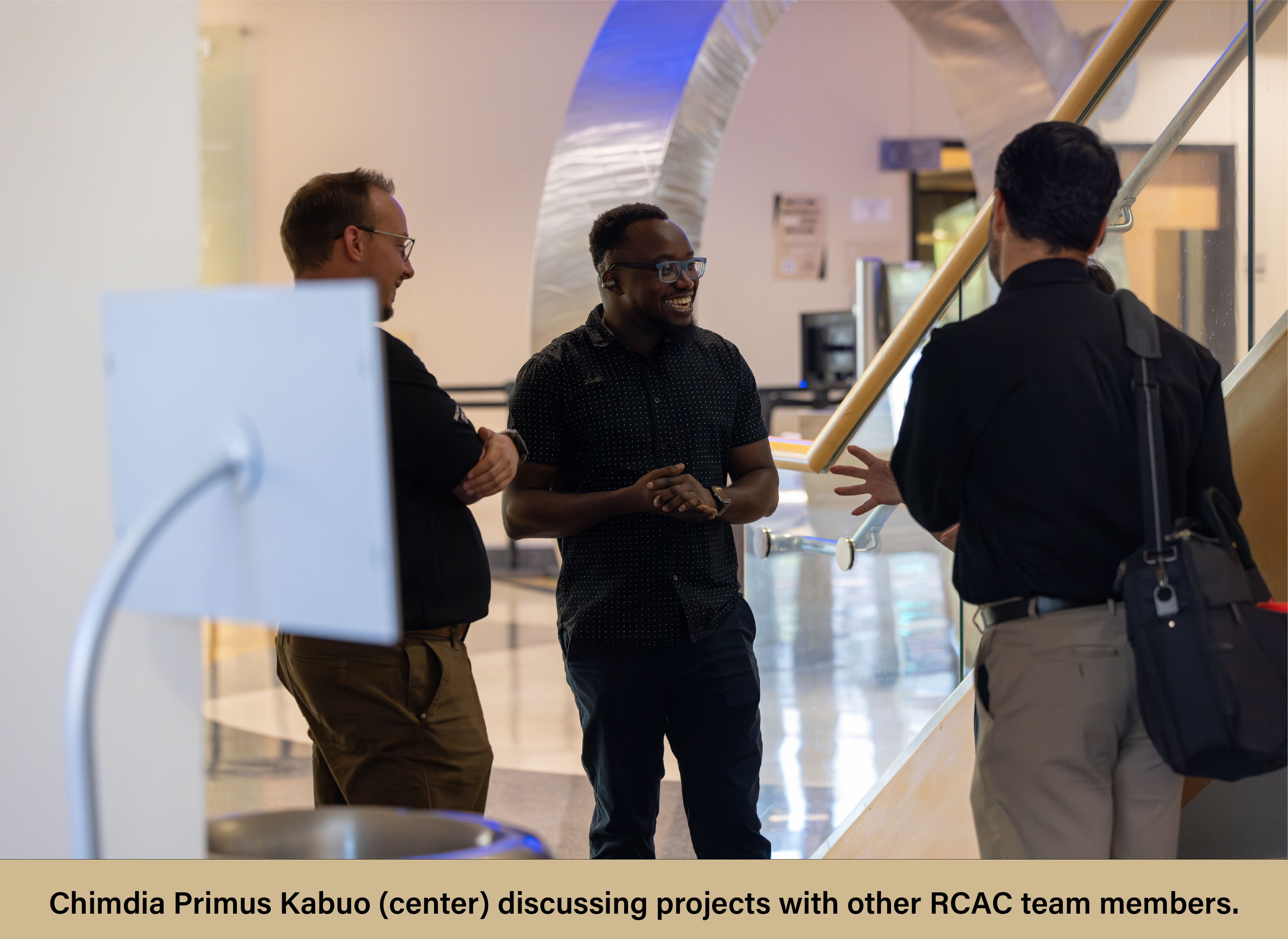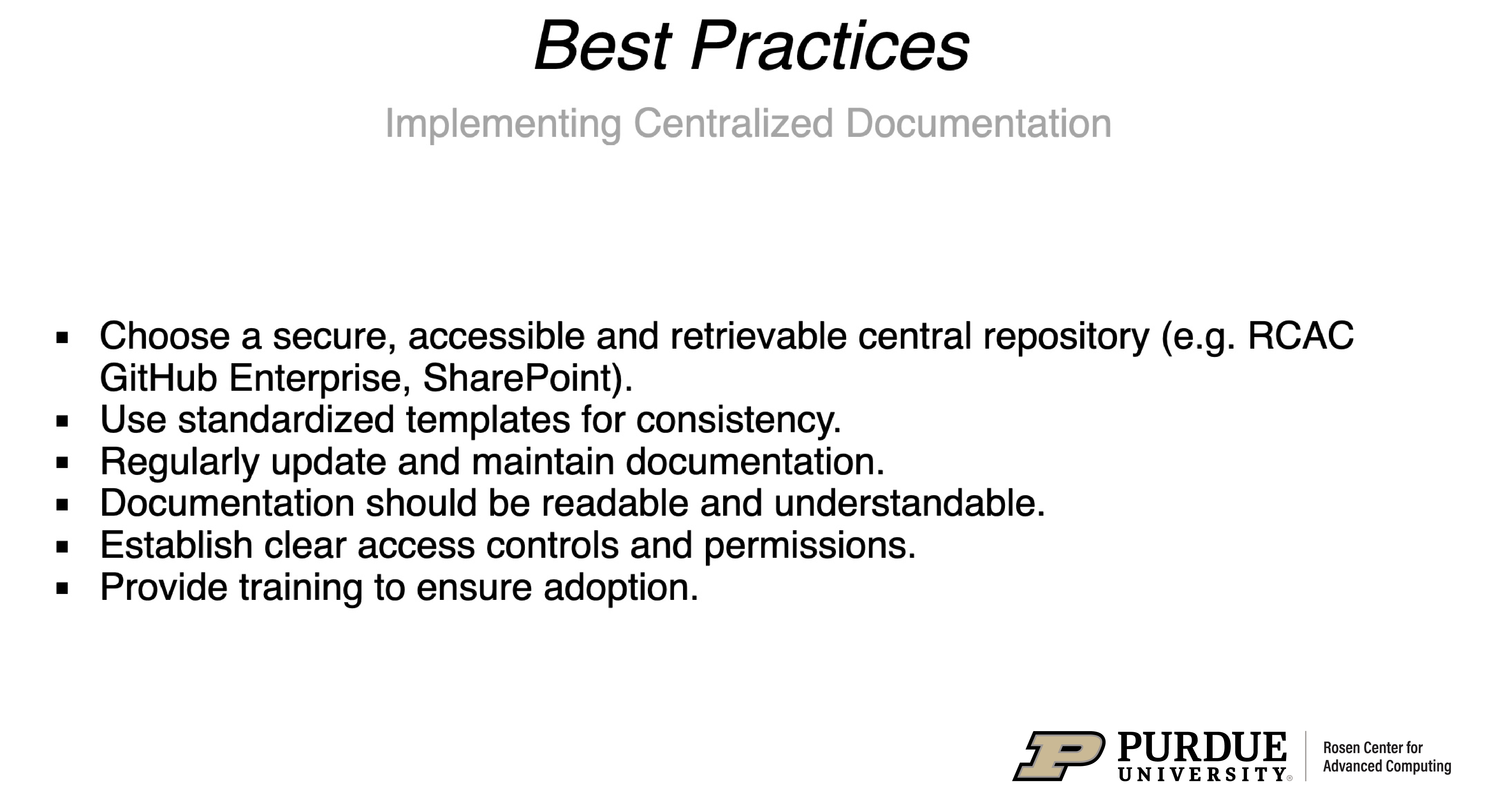RCAC Seminar Series: The Case for Centralized Project Documentation
The Rosen Center for Advanced Computing (RCAC) has recently begun hosting a monthly seminar wherein an employee of the department has the opportunity to highlight their work. The latest RCAC seminar was presented by Chimdia Primus Kabuo, a Senior Research Software Engineer, who discussed his work on Halcyon, RCAC’s proprietary unified High-Performance Computing (HPC) center operations portal, as well as the need for centralized documentation.
RCAC as an  organization exists to provide access to leading-edge computational and data storage systems as well as expertise in a broad range of HPC activities. As such, the department has cultivated an expert team of research and computing specialists who handle a wide range of tasks, all aimed at supporting researchers and system users both at Purdue and beyond. An unavoidable feature of organizations with such widespread duties and delegations of work is that, oftentimes, employees focused on different projects do not get the opportunity to learn what others on their teams are doing. This lack of clarity and awareness across teams can lead to inefficiency while simultaneously making it more difficult for individuals to receive the accolades and recognition they deserve. To combat this, the RCAC Seminar Series was born.
organization exists to provide access to leading-edge computational and data storage systems as well as expertise in a broad range of HPC activities. As such, the department has cultivated an expert team of research and computing specialists who handle a wide range of tasks, all aimed at supporting researchers and system users both at Purdue and beyond. An unavoidable feature of organizations with such widespread duties and delegations of work is that, oftentimes, employees focused on different projects do not get the opportunity to learn what others on their teams are doing. This lack of clarity and awareness across teams can lead to inefficiency while simultaneously making it more difficult for individuals to receive the accolades and recognition they deserve. To combat this, the RCAC Seminar Series was born.
The monthly seminar began as a way for individuals to share the work they have been conducting—whether it be developing new software for one of our research partners or making back-end optimizations for our supercomputing systems—or to highlight new technologies, strategies, or best practices that they have been utilizing. The seminar series has been well-received thus far, helping to spur innovation throughout the department and showcase the amazing accomplishments of different team members.
Kabuo presented at the most recent seminar. His talk focused on the need for and benefits of centralized project documentation, and how we can implement documentation best practices to enhance collaboration and efficiency across projects.
“Effective documentation is the backbone of successful project management,” says Kabuo. “It ensures clarity, accountability, and continuity. It also provides guidance for setting up and understanding the project, explains its structure, and makes onboarding and maintenance for the project easier.”
Oftentimes, the documentation of projects for software developers and engineers is best described as chaotic. Individuals may or may not keep notes on everything they did and the “why” behind their decisions.
“I think as we all know—especially those of us that write code—that at the moment you write the code, you understand what you're writing. But give it a few days, and you start to ask yourself, ‘Why did I write this? Why did I put this here?’ And if you don't have documentation on your thought process and the things you did, you might start to wonder about those decisions, and it makes the work much more difficult.”
Even when proper notes are taken, the documentation is often stored in notebooks and laptops that only that individual can access, rendering the information useless to others who may need to work on the project in the future. According to Kabuo, some problems that arise from this type of decentralized documentation strategy include:
- Multiple sources of information lead to confusion and errors.
- Key documents may be misplaced or duplicated.
- Collaboration suffers when teams can’t access the latest information.
- Version control becomes tedious.
- New team members face steep learning curves.
Centralized project documentation eliminates these challenges by providing “a single source of truth.”
After highlighting  the benefits of centralized documentation and how this can help RCAC specifically, Kabuo discussed best practices that the department can utilize and provided a blueprint for how to implement these practices throughout the organization. The first step of successfully rolling out a change of this magnitude involves choosing a pilot project to test the new system. Kabuo took it upon himself to tackle this step ahead of time, using his recent work on Halcyon as a case study.
the benefits of centralized documentation and how this can help RCAC specifically, Kabuo discussed best practices that the department can utilize and provided a blueprint for how to implement these practices throughout the organization. The first step of successfully rolling out a change of this magnitude involves choosing a pilot project to test the new system. Kabuo took it upon himself to tackle this step ahead of time, using his recent work on Halcyon as a case study.
A major developer of the Halcyon software is Shawn Rice, a former employee of RCAC. When Kabuo was tasked with working on Halcyon, Rice generously agreed to help introduce Kabuo to the system and bring him up to speed with the software. Over the course of several meetings, Rice trained Kabuo on all things Halcyon. Knowing the importance of documentation and wanting to use this as the pilot project for implementing a centralized system, Kabuo kept extraordinarily detailed notes of these training sessions. As he worked through these notes, testing and implementing different solutions for improving Halcyon, he made addendums to the documentation, highlighting what worked, what didn’t, and why. Even now, any updates or changes he makes—successful or not—Kabuo documents. This way, if someone else needs to be brought onto the project, they can read through the full record of what has been done thus far, including what has proven to be ineffective, making the onboarding process much more efficient. Kabuo hosted this documentation, titled “HalcyDocs: A Living Documentation for Halcyon and other related projects,” on GitHub. It is open and can be accessed by any of RCAC’s staff members.
Kabuo’s work on this pilot project has been deemed a success. The next steps involve gradually expanding this centralized documentation strategy to other projects throughout the department. According to Kabuo, the main pain point of the undertaking is the upfront cost of time and resources required to implement the strategy successfully. But in the long run, the benefits outweigh these costs. Once the initial work is completed, a regular maintenance schedule is all that will be needed for continued success. And by implementing centralized documentation in phases—i.e., slowly rolling out the changes across different projects—an organization can limit the disruption levied on any single individual or team’s workload.
“Centralized documentation is more than just organized information. It not only streamlines workflow but also preserves institutional knowledge, fostering continuity and efficiency as projects evolve.”
The Halcyon platform is intricately tied to RCAC’s website. Kabuo has recently implemented major aesthetic and functional updates to the system, making the website sleeker and more streamlined. To view the new look, please visit the RCAC Home Page.
More information on RCAC and its mission can be found on our About Us page. Stay updated with all the goings-on at RCAC, including recent scientific highlights, training events, seminars, and system announcements, by visiting our News page.
Written by: Jonathan Poole, poole43@purdue.edu
